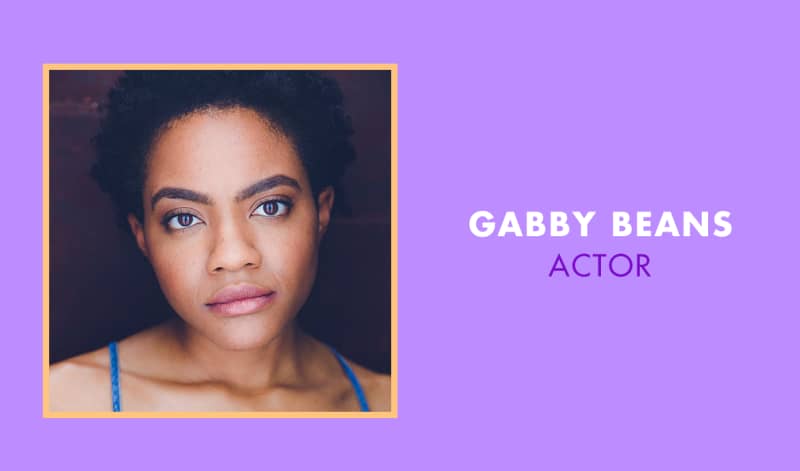Teaching Artist Leah Reddy spoke with actor Gabby Beans about her career and her work in Jonah.
Leah Reddy: What is your theatre origin story?
Gabby Beans: I think my theatre origin story arose from a bottomless need for attention and validation! That’s mostly a joke, but I do feel that initially my desire to perform came from a deep need to feel seen; whereas now I’m more invested in others feeling seen through the work.
From childhood, I enjoyed involving my family in elaborate plays and fantasies. I would imitate bits from TV shows or cartoons, and my parents would laugh and seem tickled by it, which I enjoyed. When I was younger, I practiced ballet and tap; and I always really loved performing in my dance recitals. In middle school and into high school, I started to be very involved with extracurricular theatre. I enjoyed everything about performing and rehearsing, and it felt like I had arrived at some sort of home.
In college I didn't study acting, but I studied theatre and neuroscience with the intention of later going on to medical school. At the end of college, I had a moment of very profound clarity where I thought, okay, I can sort of white-knuckle it through living a life that's expected of me or I can take a chance at doing something that truly lights me up. So instead of applying to medical school, I applied to theatre school and luckily got in.
LR: Were there any other artistic influences or teachers that had a profound effect on you?
GB: I am very lucky to have had some incredible, life-changing teachers. One is Dr. Jo Riley, who was my high school theatre teacher. She's an incredible scholar in her own right. She studied Beijing Opera for her doctoral studies, and I remember she brought her mentor to our school to perform at one point.
She did not intellectually coddle us at all. She treated us like artists, and that made us feel like artists. We were reading Sarah Kane in sophomore year of high school. And we were engaging with Brecht. We were doing Indian classical dance. Her approach was multifaceted, global, and intellectually rich. And so that had a huge effect on me.
[Dr. Riley] also just saw me. Do you know what I mean? She saw me and encouraged me and made me feel as though I had something worth sharing. And I had not felt that in academic settings up to that point, or at least not to the degree that she made me feel it. Also, I have to give props to my teachers in college, Professor Worthen in the Barnard Theatre Department, my thesis advisor Shayoni Mitra, and Charise Greene, my acting teacher in undergrad.
LR: What drew you to Jonah?
GB: The first thing that drew me to Jonah was a profound feeling – or rather a profound magnitude of feeling. The first couple of times I read the play, I was really, really moved emotionally. It was curious because I didn't quite understand why I was so moved. I mean, obviously if you read the play, it's incredibly well observed and feels so natural and is very slyly lyrical. The characters are so rich and drawn with the utmost of specificity and humor and care. Aside from all those great play ingredients, I noticed that this piece is more than the sum of its parts. Its effects are almost subterranean in depth, and so compelling. I was deeply intrigued.
Then I started to think about the character of Ana, and I was like, “I don't know if I can do this. I don't know if I have what it takes to fulfill the demands of this role.” That excited me. Those are the kind of challenges I want to take on.
I also really love that the play is redemptive. Without giving too much away, I feel like [playwright] Rachel [Bonds] has an ultimately optimistic view on what it means to learn to trust yourself and to regain trust within intimacy with others. And I think that that's a message that we could all benefit from at this time.
LR: I've worked on a few plays with similar subject matter, and the thing that has always surprised me the most is the reaction that elder women have. I'm very curious to see how this hits across generations.
GB: I think that my main goal within this piece is to be a vector of healing – to deliver the healing potential of Rachel’s words to the folks who come to see the show. My hope is that our show allows for healing to begin, or to be catalyzed, or to be amplified; or that comfort can be administered through mutual recognition. That's really all I care about. And I think Rachel's play does that by itself, and it's just about how to be the best vehicle for the message of the play to be transmitted to audiences.
LR: This play functions a lot like a memory play, from the perspective of your character, Ana. How do you think about that as an actor?
GB: I think Rachel did a smart thing where, though some of the events of the play are happening in the past in terms of the historical timeline of Ana's life, they are simultaneously happening in Ana's present experience. As I'm approaching the scenes, it's less about defining a quality of memory and more just being specific about who Ana is at that point in time. A lot of that for me is just embodying an energy of a certain age, of a certain time in life, and how that sits in the body.
LR: Jonah is a new play, so you're collaborating not just with the director and with the design team and the other actors, but you have the playwright as well. And you're originating this role. How do both of those things shift your process from maybe working on a revival of an established play?
GB: It's an immense honor to be part of the birthing process of a new play. [Director] Danya [Taymor] and Rachel are just so incredible. This room is really unlike any other room I've been in where there's so much latitude for play, but there's also such a steady hand at the helm and such a deep understanding of the story from the perspective of the director and the playwright.
Working on a new play or a revival is oddly similar. There's a reverence for language that has to be in the room. Even if things might change, it's really important to try to fulfill the demands of the text as-written first. I think the really cool part about having a playwright in a room with you is that you get the opportunity to actually affect the life of the play in subtle ways. Especially when you have a really, really good playwright like Rachel. She observes how the part kind of moves through you, and so you're able to leave your mark on something. That's never the intention, but it just happens. It's nice to feel like there's someone there to bring the writing to meet you as much as you're trying your best to meet the writing where it is. But I will say this, from when I was sent the play to now, the text has changed very, very little. That's a testament to the clarity and specificity of Rachel's writing. Not much has needed to change because it arrived to us in a very assured and complete form.
LR: Can you give our students and our audiences insight into what it's like to work with an intimacy coordinator from an actor's point of view?
GB: This is my first time working with an intimacy director, and I hope I never have to work without one again. In the same way that we have fight choreographers and fight directors, intimacy – when you're doing a show eight times a week – is as much a choreographed dance or should be as much a choreographed dance as fight or dance choreography. [Intimacy coordinator] Ann [James's] job is to help us tell the story through intimacy as best we can. She's there to create a framework and a structure so that when we're working on intimacy, we all feel safe, and our boundaries are upheld. Ann also offers de-sexualizing terminology to describe the intimacy (which removes some of the charge and discomfort from the work).
Working on intimacy in this step-by-step way that's being supervised by a professional has made it so much more comfortable, so much less awkward, so much more safe and free feeling. I feel more comfortable being vulnerable within the intimate moments because I know I'm being supported by Ann, Danya, Rachel, Autumn our assistant director, Tilly [Evans-Krueger] our movement director. Everyone in the room is coming together to support those moments and make sure that we can share of ourselves without feeling self-conscious or unsafe.
LR: What advice do you have for aspiring actors?
GB: Do it as much as you can. Work really does beget work. If you can afford class, take class. If you get the chance to perform in a warehouse somewhere in Brooklyn, and maybe it doesn't pay that much, but it's an opportunity to perform that feels like it might offer you something creatively, do that; finances and health and well-being allowing.
It's important to make sure that your life is set up in such a way that you have the energy to expend on your art. Make sure you have a job that you don't absolutely hate, that you can kind of tolerate. Make sure that you have enough flexibility to be able to go to rehearsals if you need to. Or if your job is flexible enough that if you need to leave for a couple months, you can do so. Make sure that you have friends that you can lean on and support and that you have hobbies and interests outside of acting that fill you up and bring joy into your life.
In my own career, nothing has come to me in the way that I thought it would. I haven't been doing this for that long, but I've done it for long enough that I now know that I can never predict how things will go. A high tolerance for change and the ability to allow uncertainty to exist without despair are very useful tools on this particular life path.
LR: Is there anything that I haven't asked you that you want to talk about?
GB: I am so grateful that Danya composed a cast of such talented, generous, and genuinely good men. We go to some intense places in this piece, and the level of support, play, and vulnerability within the work has been amazing to experience.



